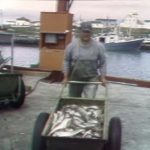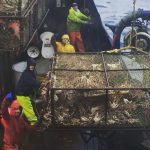Reallocation: coming to a dock near you?
I wrote Gumballs sure are fun, but policy decisions should be based on complete and accurate information (it’s at http://www.fishnet-usa.com/
Ever since quota transfers in “shared fisheries” have been made so easy to justify (see the Massachusetts justification for the recent reallocation of fluke, bluefish and black sea bass at https://tinyurl.com/yckkr6vm), such transfers each year are going to cost us hundreds of tons of product and tens of millions of dollars of business. And as long as one-third of the voting members of the eight regional fishery management councils and three commissions either work for or run the state agencies that are funded in very large part by Wallop-Breaux revenues (see my most recent piece on Wallop-Breaux funding at https://fisherynation.com/
What options do we have to make such a biased system more equitable for every seafood consumer, supporting more than just those folks who want to and can afford to “catch their own”? There’s always the opportunity to sue the feds. But, as we all know, that’s expensive…. and seems to me to be somewhat akin to locking the barn door after the horses are three quarters of the way down the road to the glue factory.
So where’s the analyses, the data, the quotes, the citations, the definitions, the tables, the charts, the comparisons, the entire wherewithal to support the commercial fishing industry’s and the seafood consumer’s position in “who should get the fish” deliberations? The culinary cravings of non-fishing seafood consumers must be largely satisfied by tilapia (Google it!), swai (Google again!) and farmed shrimp (Ditto!) from God knows where because lobbyists claiming to represent a relative handful of anglers have convinced the right politicians that their clients fishing for fun are more deserving of the lion’s share of our locally available species.
The recent reallocation of Gulf of Mexico red grouper is being challenged in Federal Court in an impressive effort by the A.P. Bell Fish Company, the Southern Offshore Fishing Association, and the Gulf of Mexico Reef Fish Shareholders’ Alliance. See https://tinyurl.com/yt7hkavk. Their seemingly compelling comments at the hearings-except to those Council/Commission bureaucrats whose budgets are to a large extent subsidized with Wallop-Breaux bucks-along with those of dozens of other participants in or businesses dependent on the commercial fishery were obviously ignored.
Were you associated with the domestic commercial fishing industry back in 2014? If you were, did you see the gumball piece linked above? If you did, did you do anything about it (like forward it to media contacts, local pols, Congressional staffers, business associates, etc.)? Or, going a step or so before that, did you have any media contacts, know any local pols, communicate regularly (or irregularly) with any Congressional staffers or business associates? If you can answer positively to any part of this, you were doing a part-a small part-of the job that you needed to do. You were reacting to what the people who were trying to put you out of business were saying. But bear in mind that’s not what is referred to today as being proactive, which is defined by Merriam-Webster as “acting in anticipation of future problems, needs, or changes.”
Being proactive is what we should have done and should be doing as an industry. It’s not impossible. Twenty some years ago a bunch of industry leaders got together and formed The Seafood Coalition, a national group at one time representing the harvesters of about half of the seafood produced by domestic fishermen. All it took was the will and the means. Unfortunately, the will and the means seem to be hard to come by today. And if they continue to be, I’m afraid that we will continue to be spectators as our historically determined proportion of shared fisheries is nibbled away with every new/updated stock assessment.
If what is being done to federal fisheries policies was communicated to the right people, with “you gotta read-and believe-this” assurances by a large enough group of credible commercial fishing supporters, do you think it might make a difference? According to the American Sportfishing Association, in 2013 less than nine million Americans fished in saltwater in 2012. That was less than 3% of the U.S. population, three hundred and sixteen million people. How many of the non-fishing population eat fish and shellfish and how many more would if it was higher quality and less costly? Without some effective industry action we’re never going to know.
Who’s ready for another serving of tilapia?
Nils Stolpe
ps – Some after-the-fact legal actions have been successful, and I have no doubt that some will continue to be in the future. But keep in mind that every time a management decision or action is overturned in court, a bunch of lawyers and bureaucrats from the Federal government, the recreational fishing groups and the anti-commercial fishing ENGOs treat that as a learning experience. And they have the luxury of time on their side. But once a commercial fishery is gone it’s most probably never coming back.
Pps – I’m always interested in reactions to what I write. Please don’t hesitate to let me know by replying directly to this email.
Coming next – Is “the best available scientific information” good enough?
For more read Gumballs sure are fun, but policy decisions should be based on complete and accurate information at http://www.fishnet-usa.com/Gumballs.pdf















































Nils your writing is always factual, interesting, and generally the sad truth. Industry had better stand up against the lies and injustices perpetrated against it or it’s going to be gone.
I believe the key to ending this unrelenting assault against commercial fishermen lies with getting the consumer involved. It’s a game of numbers. The consumer is by far the largest group of people dependent on fishermen to supply them with what used to be a plentiful and inexpensive source of protein.
If this Industry can’t unite for a common cause and work for a collective answer for the benefit of all instead of screwing your neighbor to benefit yourself then all will be lost. The onslaught of multinational corporations will continue to gobble up this industry.
As an old friend once said a long time ago…We have met the enemy…, and they are us.